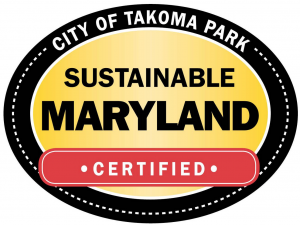On September 17th, the City Sustainability Office team joined forces with the Recreation Department to take a group of seniors for an insightful tour of the Prince George’s County Materials Recycling Facility (MRF). Our two interns, Joy Togo and Emma Spencer, offered their perspectives from the experience:
[EMMA] Our tour of the facility started with a brief presentation on the facility and the different recycling rules that apply. It was interesting to visit with such an inquisitive group, and we all learned a lot about what we are actually able to recycle. MRF is a single-stream facility, meaning that consumers don’t have to separate their recyclable materials. Instead, everything can just be placed in the same bin and there is technology at MRF that can separate paper from plastic from cardboard. In Takoma Park, our recycling gets sent to Prince George’s facility because it is a single stream. Thus, these recycling rules apply to Takoma Park residents whose recycling gets collected by the city.
Here are the top tips I took away from our trip:
- Do not bag your recyclables in a plastic bag! MRF does not accept plastic #4, which is what most plastic bags are made of. If your recycling is in a trash bag and it gets picked up, it will be just thrown in the trash. Instead, you can use an unlined trash can or bin to hold your recyclables. On the topic of plastics, MRF also does not recycle plastic #6. MRF does accept plastics 1,2, 3, 5, and 7.
- Don’t recycle anything smaller than a sticky note (3 inches by 3 inches). These small items jam up the machinery needed for sorting recyclables, so it’s better to reuse them when possible, upcycle them, or as a last resort, throw them out.
- Lids are a particularly tricky small item. If your bottles and cans have different material lids, separate them! If the lid is smaller than a sticky note, toss it in the trash OR place it inside a container made of the same material. You can then crush the container so it will keep the lid inside it. That way, the lid can still be recycled and not cause issues for the machines. For bottles and cans that have the same material lids, you can leave those lids on.
- Don’t recycle soiled materials or wet paper! However, as long as you rinse out plastic bottles and aluminum cans you can recycle them. Your recyclables should be rinsed and clean, but it’s okay they all aren’t super squeaky clean.
Touring the facility also allowed us to gain a deeper understanding of the recycling process. We got to watch the process and see the machinery in action. After recyclables are collected through curbside pickup, they are brought to MRF. There, they are dumped onto what is called the ‘tipping floor’. The tipping floor is essentially a massive empty warehouse where the recycles are all piled. From there, they are placed in a large conveyor belt that brings them back to where they will be sorted. The sorting process is complex, with machines and workers working together. First, individuals pull out hazards like large objects and plastic bags. The rest of the materials travel down a conveyor to star screens which separate flat material (paper, cardboard) from other materials (cans, plastics). The containers are then sent to the combination screen which separates any paper that made it through the star screens from the containers.
Containers continue on their journey to a large magnet that picks out the metal containers and then a machine that breaks and removes any glass containers. What’s left is mostly aluminum cans and plastic containers. They are sent to a magnetic field that uses an eddy current to separate the aluminum from plastic. The last step for the remaining plastic containers is to pass through a high-tech machine that uses optical sorting to identify what is acceptable. After being sorted, each material gets baled. Those bales are then sent to manufacturers. There, your household materials are transformed into items like carpets, clothes, and even stuffed animals that can be made with the fibers that are produced from recycled materials.
[JOY] Seeing firsthand how single-stream recycling works—where paper, plastics, glass, and metals are collected together and later separated—was eye-opening. The tour showcased the intricate process, from conveyor belts and manual sorting to advanced machinery that identifies and categorizes items based on size, shape, and type. It gave me a deeper appreciation of the complex work involved in recycling.
A key takeaway was the importance of reducing contamination to improve recycling efficiency. Facility experts emphasized that small actions—like keeping non-recyclables, such as plastic bags, out of bins and rinsing out containers—can prevent disruptions and keep recyclables from being sent to landfills. The tour left me with a renewed sense of responsibility for managing recyclables at home, showing that recycling requires more than just tossing items in the right bin; it demands thoughtful choices to ensure the system functions effectively. For anyone interested in sustainability, I highly recommend visiting a facility like this—it provides valuable insight into the recycling process and inspires us to become more mindful recyclers.
Still have questions about recycling? Learn more on the City webpage.
If you are interested in scheduling your own tour, please reach out to the staff at the MRF at 301-324-4760.
 The City of Takoma Park is proud to announce that it has achieved recertification for its sustainability efforts and has been named Sustainability Champion 2024!
The City of Takoma Park is proud to announce that it has achieved recertification for its sustainability efforts and has been named Sustainability Champion 2024!